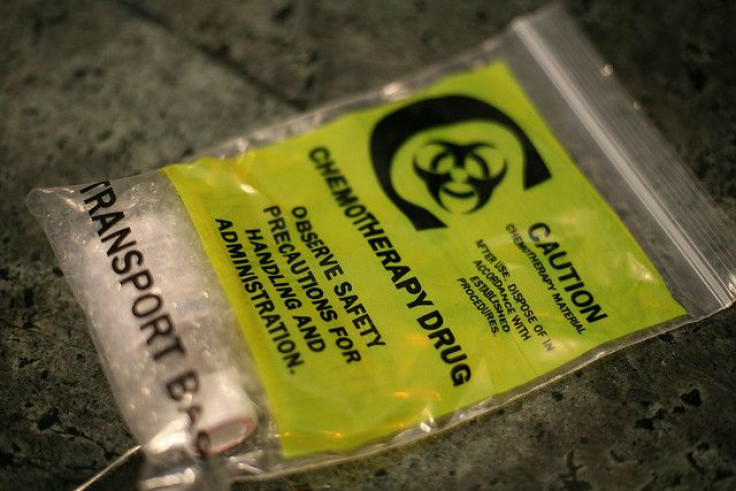No More Chemo? Molecularly Targeted Therapies Poised To Make Chemotherapy Obsolete In Treating Cancer

The days of chemotherapy as the default cancer treatment method could soon be over, as recent breakthroughs in molecularly targeted therapies — which shut down the processes that help cancer form — show great leaps in clinical trials.
Chemotherapy has proven itself successful over the last two decades, as cancer rates have dropped by 20 percent in the U.S., but its carpet-bombing method of cancer cell destruction often afflicts healthy cells in the process. Patients undergoing targeted treatments can experience less severe side effects and better survival rates due to the method's "smart bomb" capabilities of destroying harmful cancer cells while leaving healthy cells untouched.
One such hallmark of the revolutionary method comes from a pair of studies published in the New England Journal of Medicine (NEJM) last week, which tested the effects of ibrutinib, a drug used in the treatment of chronic lymphocytic leukemia (CLL).
Ibrutinib, which significantly prolongs the life of the patient by attacking the cancer-causing processes and not the cancer itself, is currently being tested on tumors that target the body's immune system, such as mantle cell lymphoma (MCL) and CLL — currently the most common form of leukemia, affecting 15,000 people each year.
Ibrutinib currently spearheads the effort in targeted leukemia treatments. Binding to the protein known as Bruton's tyrosine kinase (BTK), which plays a critical role in helping immune cell tumors to grow, the drug prevents the tumors growing inside B-cells to signal for nutrients to grow and divide. And unlike chemotherapy, the doctors say the drug doesn't affect the body's T-cells, which means less collateral damage for the patient.
"This is truly a breakthrough drug for CLL. I have been a CLL specialist since 1997, and we have not had a drug like this come into the field yet," said study author Dr. John C. Byrd, the director of the division of hematology at The Ohio State Comprehensive Cancer Center. "The most common thing I have heard patients say is that it brings their disease under control and makes them feel how they did before their cancer. I've heard that at least a dozen times."
Over the two-year study, patients had an 83-percent survival rate under the drug's treatment. Under treatment for MCL, doctors witnessed a 58-percent survival rate. While considerably lower, this statistic compares to a rate of 30 percent for the previous agent when the Food and Drug Administration approved its use.
The NEJM study's most recent precedence for molecularly targeted treatment was in 2001, when doctors saw greater improvements in patients using imatinib, or Gleevec, to treat their chronic myeloid leukemia and gastrointestinal stromal tumor (GIST).
Whether chemotherapy has reached its end "is a question we're all asking," said Dr. Martin Tallman, chief of the leukemia service at Memorial Sloan-Kettering Cancer Center. "I think we are definitely moving farther and farther away from chemotherapy, and more toward molecularly targeted therapy."
Today, the technology for treating GIST has allowed doctors to make chemotherapy all but obsolete in treating their patients' cancer, according to Dr. George Demetri, senior vice president of experimental therapeutics at the Dana-Farber Cancer Institute.
The research into targeted therapies has also illuminated surprising techniques for treating cancer's heterogeneity and unpredictability. Where chemotherapy once wiped out all the cells in a cancerous region, new treatments allow doctors to see how certain cells respond to certain treatments. If one cluster of cancer cells has mutated, and now resists one treatment, doctors can either remove the resistant area surgically or attack it with a different targeted therapy.
"That's a new concept," said Demetri. "That didn't exist before targeted therapies."
Cancers with solid tumors, such as lung and prostate cancer, tend to exhibit these heterogeneous cell clusters more so than blood-cell or immune-cell cancers, such as chronic leukemias that begin more homogenous and, thus, are easier to treat all at once.
For the solid tumors, some treatments become less effective over time as the cancer grows resistant to the treatment. So doctors are in the process of developing drugs to combat that resistance — a fight to stay one step ahead at all times.
"Where there is a lot of genetic heterogeneity, such as in most solid tumors," said Dr. Scott Kopetz, associate professor of gastrointestinal oncology at MD Anderson Cancer Center, "there is more headwind we have to fight against, more opportunities for rapid resistance to develop."
More headwind is admittedly a happier problem than the cancer itself. Targeted therapies have begun making large gains in the medical industry, ones that strip cancer of its crippling strength and remove the added health risks of chemotherapy.
"Many, many fundamental concepts in cancer are being challenged now based on new information," said Tallman. "Of course that is leading to major shifts, paradigm shifts in treatment approaches and ultimately, I think, better care [for] patients and better outcomes."
Source: Byrd J, Furman R, Coutre S. Targeting BTK with Ibrutinib in Relapsed Chronic Lymphocytic Leukemia. New England Journal of Medicine. 2013.



























